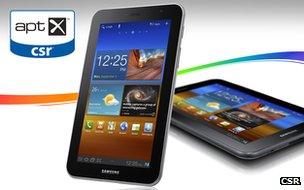Samsung buys CSR's wi-fi and bluetooth mobile chip tech
- Published

CSR's technology had already featured in Samsung's Galaxy Tab 7.0 tablet and Galaxy S2 handset
Samsung has bought the mobile-phone technology division of CSR - the British firm formerly known as Cambridge Silicon Radio.
The <link> <caption>$310m (£198m) deal</caption> <url href="http://ww1.global3digital.com/csr/regulatorynews_item.jsp?ric=CSR.L.TK&ref=62016" platform="highweb"/> </link> includes patents to the firm's bluetooth, wi-fi and GPS location innovations.
Samsung said the move would allow its semiconductor unit to "strengthen" its line-up of mobile-device processors.
The firm's chips are already used in its best-selling Galaxy handsets as well as Apple's iPhones and iPads.
Samsung competes for business from other handset makers against the chip-makers Qualcomm, Texas Instruments and Intel.
Integrated tech
CSR's chief executive said his firm offered "extremely important" technologies, but was aware of a trend in which larger firms were acting to integrate many functions into a single chip-set reducing demand for specialist parts.
"I believe under Samsung's ownership the handset operations will be in a better place to prosper in the global handset market," said Joep van Buerden.
"I would like to thank all our colleagues who will be transferring to Samsung for their outstanding service."
About 310 members of CSR's technology and handset team will now switch over to the South Korean firm.
Samsung's buying spree
CSR had posted a $16.6m loss for the first three months of the year as a result of costs involved with its 2011 takeover of US rival Zoran.
It had also been knocked by falling demand for Nokia and Blackberry-branded handsets that used its technology.
The acquisition follows Samsung's takeover of Nanoradio, a Swedish company specialising in energy efficient wi-fi chips, six weeks earlier.
"If integration is the way forward for mobile chips then this move should allow Samsung to target the mass market with cheaper integrated processors," David McQueen, principal analyst at the telecoms consultancy Informa, told the BBC.
"The patents may also give Samsung an extra means of fighting back in intellectual property cases involving its Android devices, bearing in mind it is involved in disputes with Apple and others."
Samsung has also taken a 4.9% stake in the remaining part of CSR.
It develops audio technology that has been used in headphones made by Sennheiser and HTC's "Beats by Dr Dre" range as well as TV soundbars and speaker docking stations for MP3 players.
- Published9 July 2012
- Published9 July 2012
- Published26 April 2012